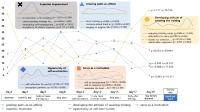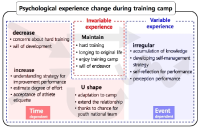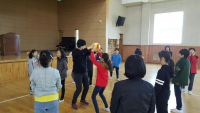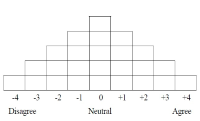PURPOSE The purpose of this study is to section the stages of performance development based on the track and field athletes' performance records, derive the performance development span, which was a continuum of the development stages, and extract the psychological experience of the performance development span. METHODS In this study, 56 retired track and field athletes were provided with competition records, and 10 athletes participated in in-depth interviews. With the stage of performance development partitioned using long and short-term moving averages and regression slope in PRR, a continuous of performance development span was derived. To extract psychological experiences in the performance development span, a subject analysis was conducted after an in-depth interview. RESULTS First, the track and field athletes' performance development stage calculated short and long-term moving averages in the PRR. Based on the average difference in the regression slope of the initial 20% CPR in which the long-term moving average was not calculated, it was divided into beginning, rising, peak, and decline periods. Second, the performance development span was a continuum of the stage was of performance development, and the beginning period was 0 < PRR ≤ 7, it was a time when the competition record rises sharply. The rising period was 7 < PRR ≤ 60, which was a virtuous cycle time of growth athlete. The peak period was 60 < PRR ≤ 74, which was a time when the peak record was maintained. The decline period was 74 < PRR ≤ 100, which was a time when the competition record was downward. Third, throughout the performance development span physical intelligence of track and field athletes was based on their natural physical superiority, the technical skills rises and remains at its peak and then enters a downward trend. Competitional Intelligence aims to become personalization as it matures gradually while its competition management capability and game knowledge are immature. Psychological intelligence overcomes the initial psychological atrophy to form confidence, and after experiencing psychological burden at the peak, confidence decreases. In the environmental context, the competition record rises in the early stages, continues to rise, peaks, and enters a downward trend. CONCLUSIONS Track and field athletes' performance development span was implemented as a continuum of beginning, rising, peak, and decline periods, and the psychological experience of the performance development span formed a span of physical intelligence, competitional intelligence, psychological intelligence, and environmental context.

Purpose The current study aimed to identify national youth cyclist`s experience and change tendency of experience during camp training. Methods A total of 35 cyclists who participated in 2017 Korea youth national cycling camp training provided the data. The survey was conducted 9 times during the 20 days of camp training using open-ended questionnaire by diary method. The collected data were analyzed based on inductive categorization and response rates. This study was conducted in the order of formation rapport, data collection, and data analysis. Results Youth cyclists experiences during camp training to growing pains as an athlete, developing the attitude of savoring training, serve as a motivation, expertise formation and opportunity of self-examination. Based on the change in response frequency of the survey data, camp training experience falls into two categories: variable and invariable. Conclusions Youth national cyclist were growing their growth power through various experiences during the training camp, and these experiences changed to specific inflection points from the beginning to the end of the camp. Understanding changes in psychological experience can provide the design of timely psychological support and coaching method. This study will be used as a material for the design of the camp training program for the youth cyclist, as well as an opportunity to increase the interest of continuity reflection on the psychological experience.


This study conducted to explore K-League (Korea Professional Football League) referees’ psychological experience and coping strategies just after the moment of wrong judgment. Open-ended questionnaire were conducted on 35 full-time referees who participated in the K-League winter training camp. The data were categorized by inductive content analysis. The results were as follows. Psychological experience yielded 45 raw data points, which were based on the following 10 sub categories; increased anxiety, rumination wrong judgment, concern about reprimand, and feeling apologetic; and four general categories including, psychological fragmentation, feeling helpless, concern about reputation, and acknowledgment of wrong judgment. Thus, K-league referees experience a psychological turbulence just after the moment of the bad calls and worsen feelings of helplessness about the wrong decisions. Also, K-league referees worry about further disadvantages following the misjudgement and admit their bad calls feeling sorry for teams and athletes who were in the incidents. Coping strategies yielded 55 raw data points from which the following categories were identified 11 sub categories; increasing concentration, attempting to forget wrong judgment, apologizing on wrong judgment, and change in thinking; and four general categories including, emotional self-support, avoiding situation, correcting the error and thinking, and changing of refereeing approach. Therefore, K-league referees enhance their concentration in order to not reoccur wrong judgement after the moment of the mistakes and try to forget the incidents of wrong judgement. Also, K-league referees apology to the teams and athletes who experienced the bad calls and make efforts to correct the mistakes if possible. Moreover, K-league referees try to modify a criteria of judgement in order to manage aftereffects of wrong judgement and make decisions correctly by approaching the scenes of the wrong judgement. The study emphasizes the importance of referee psychological stability on the field and the need for psychological support. The study is expected to encourage further research on sports referees in Korea to ensure they receive appropriate psychological support.
PURPOSE This study explored psychological experiences in long jump competitions and examined the continuity of psychological experiences over time. METHODS A total of 28 adult long jumpers, 18 men and 10 women, were provided data through in-depth interviews. Data on psychological experiences were extraced through inductive content analysis, while continuity by period was analyzed by calculating the response frequency ratio using Excel. RESULTS First, the psychological experience in the long jump competition was categorized as fundamental, competition intelligence, emotional control, and communication capacity experience. Second, in long jump competitions, results showed that jumpers experienced mixed feelings of anxiety and pressure, self-confidence, and concentration in the first period; peer communication and analysis thinking were necessary in the second period; practical intelligence and pressure control were important in the third period; learning ability and creativity were crucial in the fourth period; learning ability and coach communication were applied in the fifth period; and fighting spirit and creativity were present in the sixth period. Third, the psychological experience of long jumpers by period, basicphysical strength was maintained; competition intelligence increased in the second and fourth periods; communication skills increased until the fifth period, and decreased after; while emotional control decreased. This reflects the contextual changes over time andthe change in competition records owing to that. CONCLUSIONS In the long jump competition, psychological experience changes by period and affects competition records. This study will contribute to further understanding of psychological continuity.

The purpose of this study was to examine the relationship among service quality, psychological experiment, and positive feedback including the moderating effect of motivation at Formula One World Championship. Therefore, the proposed research model was divided and compared by the level of motivation. By using questionnaire method, we found the following results. First, high motivation group indicated a higher-level of service quality, psychological experiment, and positive feedback than low motivation group's. Second, service quality had an influence on positive feedback directly and indirectly with the psychological experiment as a mediator. Third, it would be more effective for high motivation group that driving positive feedback through promotion while both promotion and watch is effective for low motivation group to drive positive feedback. Thus, promotion is considered as an important factor in both high and low motivation group and the watch needs to be strengthened in high motivation group.

The purpose of this study was to examine psychological capital acquisition through Asian Games Participation. 17 of national women football players were completed Psychological Capitals Questionnair. The psychological capital consists of optimism, psychological skills, self-management, collective efficacy, and performance perception was investigated after the team call-ups and before the team-release. The data was analyzed by paired t-test. As results, Korean women football players’ collective efficient and performance perception showed a statistical significance at the beginning of the team call-ups but optimism, psychological skills, and self-direction did not show statistic significances. The team-harmony, interpersonal-management, team-power, sufficient training, trust in coach, efficient communication, and psychological football factors, which were subfactor of football players’ psychological capital, showed statistical significances. However, confidence, concentration, goal-setting, imagery, willpower, anxiety-control, mental-management, life-management, training-management, innate-behavior management, physical-management, football skills, mediative skills, and football intelligence factors did not have statistic significances. These results demonstrate that effects of mega sporting events-like experiences and psychological factors’ variability and inflexibility according to weather changes should be considered when it comes to discussion of psychological factors regarding players’ performance. It is expected that this study would be a fundamental resource for understanding of psychological influences through participations in mega sporting events and discussions about further psychological interventions for teams with environmental consideration as well as methodological developments which could measure effects of the psychological interventions.

Purpose This study aimed to investigate the psychological capitals created by the experience of winning an Olympic medal by using the photovoice method. Methods Data were collected on the way the participants-five Bronze medalists in the Women's volleyball in 1976 Montreal Olympics-take and send photographs. The interviews were conducted by phone based on the collected data. The photographs were placed into the parent category after conducting inductive content analysis, and their validity was confirmed from the expert meetings. Results The results of the study, indicate that the participants have earned psychological capitals such as my matter volleyball for diligence, the gift of a Bronze medal to gratitude, the source of achievement, challenges, and key of relationship tenderness from the experience of winning an Olympic medal. Conclusion In this regard, this study provides an opportunity to extend the study on the lives of retired athletes who won an Olympic medal to various perspectives, as well as the impact of sports experience on everyday life.










PURPOSE Players’ nonverbal behavior during a game may be expressed through selfregulatory and intentional processes, where nonverbal cues are strategically used to achieve specific outcomes. This study aimed to observe and explore the strategic and intentional nonverbal behaviors utilized by table tennis players. METHODS The study utilized a grounded theory methodology and involved purposeful sampling of ten adult table tennis players. Semi-structured face-to-face interviews were conducted. The collected data were analyzed using open, axial, and selective coding techniques. RESULTS The findings revealed that players’ intentional nonverbal behaviors are influenced by their confidence levels, physical condition, and perceptions of others’ nonverbal cues. Throughout this process, players underwent various emotional experiences, worked to maintain a positive mental state, and experienced changes in both their behaviors and psychological states, which impacted the flow of the game. CONCLUSIONS This study’s results provide valuable insights into the role of intentional nonverbal behaviors utilized by athletes during competitions. This suggests that understanding and incorporating intentional nonverbal behavior should be a key consideration in sports psychology counseling and psychological skills training.

Purpose The purpose of this study is to conduct a typological classification of female recreational sport participants' coaching experience. Methods Q methodology was conducted using 25 Q-samples and 25 P-samples. Data were analyzed using PQmethod software. Results Four types were categorized: communication and character-oriented (I), function and immersion-oriented (II), process and fun-oriented (III), and function and inclusion-oriented (IV). These types were re-categorized as 'non-functional value-oriented (I, III)' and 'functional value-oriented (II, IV)'. Conclusion This study also made efforts to explore the value and norm that female participants expect from sport participation, which provided a variety of perspectives on social, psychological and philosophical discussions about woman sport. In addition, each type and its characteristics can be used as meaningful basic data in teaching method (coaching theory) for woman sport.


Purpose This study aims to investigate the experience of service yips in badminton players in depth through using grounded theory method. Methods We collected data from in-depth interviews with 14 participants in total, consisting of badminton players who experienced service yips, their doubles partners and coaches. The collected raw data were analyzed base on derive transcription, coding and paradigm models through grounded theory method. Results First, as a result, 59 concepts, 31 subcategories and 15 categories in regard to badminton service yips were deduced from open coding. Second, in axial coding, it was structured in a paradigm model by categories such as service yips, service mistakes, service proficiency, service anxiety, the imprinting experiences, the importance competition, the pressure of achievement, service practice, psychological control, tactical handling, support from partners, leaders’ coaching, advice from experienced ones, overcoming yips and persistent yips. Third, selective coding resulted in ‘Badminton service yips’ as the core category of this study. ‘Badminton service yips’ is a chronic performance impairment associated with badminton players making severe errors in swing motion on a service not intended by them that it is due to physiological or psychological symptoms such as hand tremors, overall body stiffness, arms stiffness, overstress, overanxiety, and concern over service mistakes. Conclusions We expect our study can be a theoretical foundation for understanding and explanation of ‘Badminton service yips’ and a useful reference for badminton players suffering from psychological difficulties caused by their service yips. The findings in this study should be considered for the development of potential strategies for overcoming the badminton service yips.
